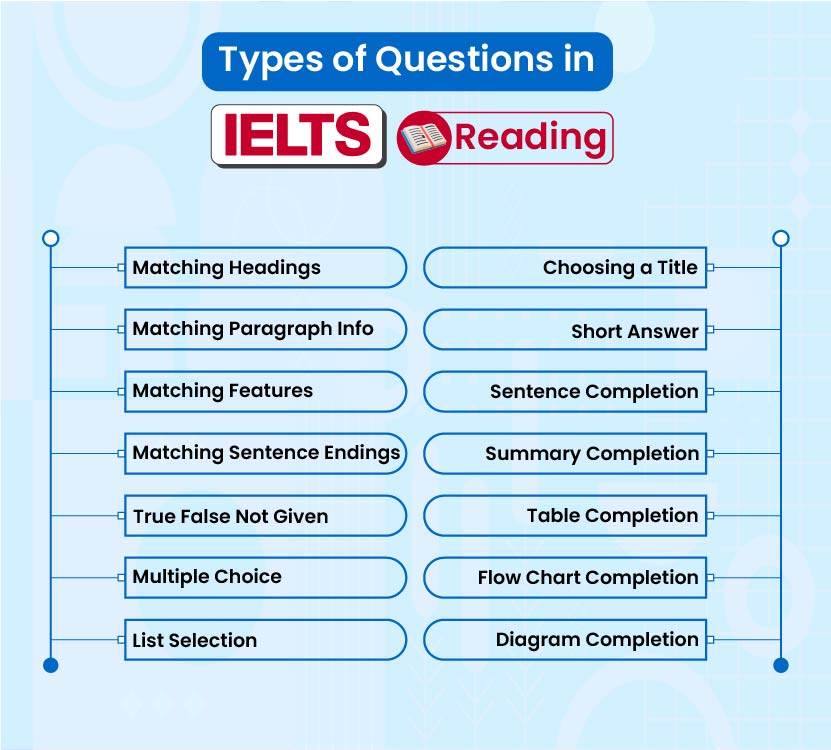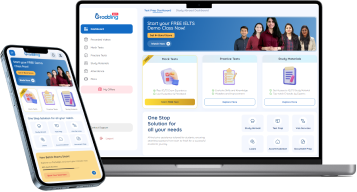In IELTS Reading, there are 14 question types divided into 3 sections for a total of 40 questions. Each section has 3 or 4 different types of questions to answer. To complete all the answers in the reading section of IELTS, you only have one hour. In order to prepare well for your test, make sure that you practice each type of question. Thus, this blog covers the IELTS reading question types for both Academic and General along with tips and strategies to help you. Now let’s discuss how many types of questions are there in the reading section of IELTS.

Table of Contents
The IELTS Academic and General reading tests require you to answer 40 questions in a time period of 60 minutes. Therefore, there is no such difference in that regard. Both tests have a similar structure, the main difference is the level of difficulty. To excel in this section, it is important to understand the various reading types of questions. These questions are particularly designed to evaluate your skills such as reading for gist, finding information, and understanding logical arguments. By familiarizing yourself with the types of questions in IELTS reading, you can enhance your overall performance in this section.
The IELTS Reading test consists of three large texts that have a range of styles, from descriptive and factual to analytical. It is collected from materials such as books, journals, magazines, and newspapers. The questions are particularly suitable for individuals aiming to enroll in a university or pursue professional registration. Moreover, in the image below there are various question types of IELTS reading test that can be asked in your exam.

Let’s understand the questions of the IELTS reading section in detail.
The IELTS Academic and General Reading test comprises 40 questions. Each question is of 1 mark. There are various reading types of questions used in the test to assess your skills. Now, let’s go through each question and the skills you will need for each one, as well as helpful tips.
A list of headings marked with (i, ii, iii,..) and a passage with lettered paragraphs (A, B, C,...) are given. You must match the heading to the correct paragraph and write the appropriate number on the answer sheet. To make the task harder, there will be more headings than the number of paragraphs
In this question type, there are several paragraphs labelled with different letters (A, B, C,...). You are supposed to match the information given in the question with the information found in one of the paragraphs. The task demands to write the letter of the correct paragraph on the answer sheet.
In this question of IELTS Reading, you need to match a set of statements or a piece of information from the given options. These options are a group of features from the passage. There’s a possibility that some options will not be used while some may be used more than once
The first half of the sentence will be provided, and you will need to match it with the second half. To complete the sentence use the information from the passage.
Among all the types of questions in IELTS reading, this is the most tricky one. You will see statements that you need to identify as True/False or Not Given. You need to understand that which information is in the passage, which is not, and which is not included.
In this, you will see a question with a selection of options (in letter format from A-D). The format can be a question or completing the sentence with the correct option. You are required to choose the right option from the list.
Among the IELTS reading types of questions, this one is a little confusing as it resembles other variety of tasks in the reading section. In this, you will see a question and a list of possible answers, similar to the MCQs. Moreover, this question will tell you how many answers you will need to select, so you will need to select more than one answer.
Get Trained from experienced IELTS instructors through engaging live online classes
Book FREE IELTS MasterclassIn this question of IELTS Reading, you have to choose the best title for a passage, based on the information given in the passage.
In IELTS reading question types, students find this question easiest to answer. You must answer the question using information from the text with a short phrase. Write your answers in specific words/numbers as per the given instructions.
In this question, you are asked to complete the sentence with a specific number of words. It may be ‘one word, two/three words, no more than three words/a number, and so on.
You will see a summary of a passage. To answer you must use the real text to complete it. The answers don’t need to appear in the same order as given in the passage.
You will notice a table with missing information. Your task is to complete the summary using one word from the list for each gap.
You will see a flow chart with misplaced information. You need to correctly fill the flow chart, and may or may not have a word bank. Flow Charts are typically considered “Most Difficult” in the IELTS Reading section.
You will spot one or more diagrams with incomplete labels. Using information from the passage, you need to fill those gaps.
Overall, these are the 14 types of questions in IELTS reading that you will be facing. Now let’s discuss in the next section the common challenges in the reading types of questions and how to overcome them.
Passing the reading section of IELTS is more than a challenging task. However, without proper preparation and strategies, you cannot score well in the reading portion of the exam. As we discussed above, regarding the different question types of IELTS reading test, this section covers the difficulties students face in this particular part. Below listed, are some of the common challenges of the reading section.
Overall, these are the most common challenges that any student faces in the IELTS reading part. To overcome these issues you can start your IELTS journey with us. Now our next section covers some strategies that you can use to ace the types of questions in IELTS reading.
Suggested Read:IELTS Vocabulary Words: An Ultimate List of Vocabulary for IELTS
Achieving success in the IELTS reading section requires more than just a good grasp of English. It demands a strategic approach tailored to the unique challenges of the test. To excel, you must clear your techniques to grab the information quickly and accurately from the texts provided. Thus, to make yourself ready and prepare for reading question types for IELTS look at the strategies below.
1. Skimming and Scanning: These two are the most effective techniques for managing the complex sentences in the reading section. When you skim a paragraph, you get an overview or main idea of the passage. On the other hand, scanning involves searching for specific data and keywords.
2. Effective Time Management: Time management is one of the crucial skills that can make or break your performance. The reading section is not liberal with time, so it’s important to pace yourself. Another time-saving strategy is to read the questions before diving into the passage.
3. Building Vocabulary and Comprehension: The IELTS exam pattern for the reading section is based on strong vocabulary. As it is a key to unlocking the meaning of complex sentences. Regularly read academic texts, journals, and articles to familiarize yourself with the formal language. The more students read the less challenge they find in the passage.
Overall, the reading section is difficult and these strategies will help you achieve the desired score.
Finally, this blog has helped you to get familiarized with IELTS reading question types, and implement the tips provided for each task. Through the tips and skills, you can enhance your performance and overall score. With consistent efforts, you can confidently navigate the reading section and achieve success in your IELTS exam. Develop a study plan that focuses on each question type individually. Moreover, if you want to prepare for the IELTS reading section then join our offline or online IELTS classes at Gradding.com

We are available in :
BangaloreAhmedabadJaipurHyderabadKeralaPuneChandigarhMumbaiGurgaonChennaiKolkataTrivandrumNoidaKochiCalicutKottayamKollamThrissurIndoreUdaipurdisclaimer:logos and other registered trademarks of universities used on this platform are held by their respective owners. Gradding does not claim ownership or association on them, and their use is purely for informational and illustrative purposes.

 Take Reading Mock Test Now!
Take Reading Mock Test Now! 


